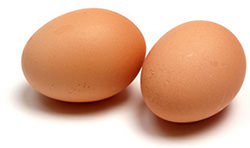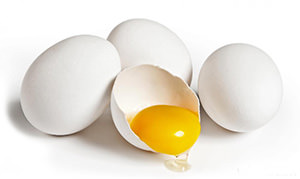
Are eggs good or bad for you? The final verdict
Posted on 28 Dec, 2019

Eggs and Cholesterol – How Many Eggs Can You Safely Eat?
 Eggs are among the most nutritious foods on the planet. However, they have gotten a bad reputation because the yolks are high in cholesterol. A single medium sized egg contains 186 mg of cholesterol, which is 62% of the recommended daily intake.
Eggs are among the most nutritious foods on the planet. However, they have gotten a bad reputation because the yolks are high in cholesterol. A single medium sized egg contains 186 mg of cholesterol, which is 62% of the recommended daily intake.
People believed that if you ate cholesterol, that it would raise cholesterol in the blood and contribute to heart disease. But it turns out that it isn’t that simple. The more cholesterol you eat, the less your body produces.
Let me explain how that works…
How Your Body Regulates Cholesterol Levels
Cholesterol is often seen as a negative word. When we hear it, we automatically start thinking of clogged arteries and heart attacks.
 But the truth is that cholesterol is a very important part of the body. It is a structural molecule that is essential to every single cell membrane. It is also used to make steroid hormones like testosterone, estrogen and cortisol.
But the truth is that cholesterol is a very important part of the body. It is a structural molecule that is essential to every single cell membrane. It is also used to make steroid hormones like testosterone, estrogen and cortisol.
Without cholesterol, we couldn’t exist.
Given how incredibly important cholesterol is, the body has elaborate mechanisms in place to ensure that we always have enough of it available. Because getting cholesterol from the diet isn’t always an option, the liver actually produces cholesterol.
Back to the egg question. When we eat more eggs, the liver produces less cholesterol, and it evens out. What this means is that ingesting cholesterol in your diet doesn’t necessarily raise cholesterol in your blood.
 Eggs, Cholesterol and Heart Disease
Eggs, Cholesterol and Heart Disease
For many decades, people have been advised to limit their consumption of eggs, or at least of egg yolks. They were told that because of the cholesterol in them, they are bad for the heart.
Many studies published in recent years have examined the relationship between egg consumption and the risk of heart disease.
In one review of 17 studies with a total of 263,938 participants, no association was found between egg consumption and heart disease or stroke. Some studies even showed a reduced risk of stroke.
The response to egg consumption varies between individuals:
- In 70% of people, eggs don’t raise total cholesterol at all.
- In the other 30% (termed “hyper responders”), eggs can mildly raise Total and LDL cholesterol. However, egg consumption appears to change the pattern of LDL particles from small LDL to large LDL, which is linked to reduced heart disease risk.
HDL, which stands for High Density Lipoprotein, is often referred to as “good” cholesterol. In one study, 2 eggs per day for 6 weeks increased HDL levels by 10%. People who have higher levels of HDL usually have a lower risk of heart disease, stroke and various health problems.
The Other Benefits Of Eggs
Eggs have a very impressive nutritional profile. Both the white and yolk of an egg are rich in nutrients - proteins, vitamins and minerals with the yolk also containing cholesterol, fat soluble vitamins and essential fatty acids. Eggs are one of the most nutritious foods on the planet.
The purpose of this article, however, is not to focus on the nutritional benefits of eggs, but to tackle that age-old question of whether they are bad for you. To find out more on the benefits of eggs, check out our article, Why Eggs Are Considered A Superfood.
 Conclusion
Conclusion
Eggs are one of the most nutrient dense foods on the planet but people have stayed away from it because they were told it was high in cholesterol and caused heart disease. From the overwhelming evidence that has emerged over the years we can now see that the opposite is true. Avoid eggs because they are bad for your heart… this is one myth that nutritionists need to expel.
Photo Credits
The Best Egg Cookbooks

by Marie Simmons

by Jennifer Trainer Thompson

by Jodi Liano


 The Best Foods For Stress Relief
The Best Foods For Stress Relief Common Food Labels And What They Mean
Common Food Labels And What They Mean Why Eggs Are Considered A Superfood
Why Eggs Are Considered A Superfood Proper Posture
Proper Posture










